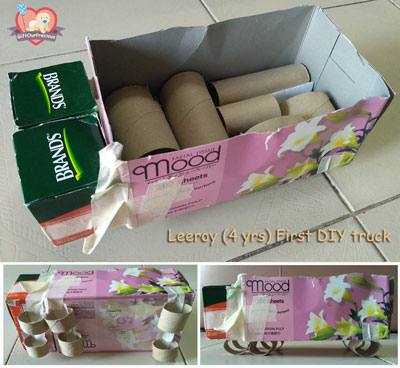
It is known that children need to experience failure to build resilience. According to Dr. Laura Markham, who is trained as a Clinical Psychologist at Columbia University and the author of Peaceful Parent, Happy Kids: How to Stop Yelling and Start Connecting, building resilience in children comes from the experience of learning that one can pick themselves up, try again ,and succeed.
When children experience failure over and over again and have no support to keep trying again, they may learn that they are failures. Therefore, emotional support and some experience of success is required for children to build confidence and resilience.
Children learn from facing and overcoming challenges but also learn best when success is experienced as they motivate them to face and master harder challenges. Constant failure will result in children losing confidence, giving up which lead them to more failure.
We as parents have to strike a balance in providing appropriate support to our children and yet not over protecting them, which in turn hinder our children’s development of self-confidence, resourcefulness and competence in solving their challenges.
Kindness in words creates confidence.
Kindness in thinking creates profoundness.
Kindness in giving creates love.
– Lao Tzu –
Below are 12 Tips on how we can raise confident and resilience kids :
1. Stop controlling and start coaching.
“The exhausting cycle of constantly monitoring their work and performance…makes children feel less competent and confident.”
– Elizabeth Kolbert
Coaching help kids to develop their skills, but kids are the ones to play the game. Our role as parents is to provide support for our child so he can flourish and develop.
We as parents need to manage our anxiety to control and let our child have the chance to build their confidence. Doing things with him instead of for him will help him to build his competency and hence build his confidence over time.
For example, by doing the homework for our child or correcting it will hinder our child from learning and developing his competency.
“Homework is a tool for teachers to know whether the child is learning or not,” According to Laurence Steinberg, PhD, writer of The Ten Basic Principles of Good Parenting. “If you do the homework, you’re not letting the teacher know what the child is learning.”
2. Perfection is not the goal.
We the parents have to resist the temptation to try to correct and improve on our child’s task, unless it is important in affecting the final result.
If we intervene constantly, our child’s confidence may be undermined, which in turn may hinder his motivation for self-learning.
3. Let him try to do it himself from the earliest age.
Our child should be allowed to attempt some simple tasks from a young age. We as parents can stand by at a safe distance, smiling and giving out appropriate encouragement, only extending our helping hands when absolutely necessary.
For example, by managing our own anxiety and worry for our child and letting him try climbing the play structure we can help him to grow and expand his learning.
We as parents can stay close and ask him if he is keeping himself safe, witness his attempt, smiling at him proudly and praise him for his effort and success in conquering the obstacles.
We can smile proudly and tell him, “Well done! We know you can do it!”
On the other hand if he falls, we are there to catch him, allowing him to attempt again.
4. Help him build confidence by tackling manageable challenges.
A term used by emotional development researcher known as Scaffolding is a framework to describe the supportive role in children’s learning by an adult.
Scaffolding allow the child to perform a task or solve a challenge which may be beyond his abilities.
It works as a bridge to new skill levels using three key points;
- modeling the skill
- giving clues and asking questions when the child is trying out new skills
- withdraw the support when the child approaches mastery
We can show our child how to perform a task and suggest a strategy or simply just observe him trying.
This form of assistance allow him to achieve greater success when trying out new task.
This in turn build his confidence to attempt new tasks and challenges by himself knowing that support is available if he really needs it.

The above is Leeroy’s first self-made truck when he was 4 years old. Leeroy, we (Dad and Mum) are so proud of you, you did it all by yourself. Well Done!! 🙂
First, he cut out the top of an empty tissue box using a pair of scissor. Next, he cut out toilet roll as wheels. Finally, he pieced them all together with 2 empty chicken essence boxes in front using masking tape.
5. Don’t set him up for failure.
Provide some form of support structure to help him succeed.
It is often hard for us parents to decide when to extend our help to our child.
This is especially so when we see that he is headed for failure, and we were having dilemma whether to let him learn through his failure or to help him, which may in turn hinder his learning process.
But research has shown that children who see their parents stand by and let them fail feels that they are not being loved, and thinks that their parents did not care enough to help them or to teach them to overcome failure.
Therefore we as parents have to guide them appropriately and at the right way.
For example, when doing school project, we should guide him in organizing and planning his ideas and work.
We should resist doing the project half way for him or improve on the project for him ourselves, otherwise he will learn that he is incompetent, or the parents can bail him out when he is lazy.
6. Encourage. And teach self-encouragement.
Everyone need encouragement and so does our child.
Giving encouragement to our child keeps him positive and motivated.
Frequent encouragement also helps him to build a positive and optimistic subconscious mind to self-encourage himself throughout his lifetime.
When our child encounter challenges or failure, encourage him with mantras such as “I think I can”, “Never give up, practice makes progression” and “If I keep on trying, I will succeed”.
By teaching him self-encouragement, he will be able to drown the self-criticizing voice trigger by disappointment when there is failure, instead he will be self-motivated to keep on trying and improving.
According to Christine Carter, author of “Raising Happiness: 10 Simple Steps for More Joyful Kids and Happier Parents”, optimistic people tends to be:
- more successful at school, work and athletics
- healthier and live longer
- end up more satisfied with their marriages
- less likely to deal with depression and anxiety

7. Instead of evaluating, describe and empathize.
Instead of just praising “Good job!” and evaluating the result of our child’s action, we can describe to him what he did and empathize with his feeling, so that our child can be empowered to do self-evaluation and not rely on external sources to evaluate him.
For example, we can say, “You keep on trying and did not give up, you must feel great that you manage to complete the obstacle course!”
8. Focus on effort, not results.
We should give positive feedback on specific things that he has control over rather than things that he has no control over.
For example, feedback such as, “I can see you have put in a lot of hard work on this project!” or “You have practice a lot on your piano, well done!”
Positive feedback should be given to hard work and determination instead of being intelligent.
Our aim is for him to keep trying and improving, and to learn that by trying, improving, not giving up and continue to work hard, he can be successful in achieving his goals.
According to the book, “ Raising Happiness: 10 Simple Steps for More Joyful Kids and Happier Parents” by Christine Carter, research done shown that: the majority of the kids praised for their intelligence wanted the easier puzzle; they weren’t going to risk making a mistake and losing their status as “smart.”
On the other hand, more than 90 percent of growth mind-set-encouraged kids chose a harder puzzle.
9. Model positive self-talk.
A child tends to model the parents, hence we as parents should take note to talk positively to ourselves instead of making self-disparaging comments in front of our child.
It is shown that positive self-talk can improve our ability to master difficult tasks.
Parents have to train ourselves not to berate negatively to our child or to ourselves in front of our child.
Many parents know that they should not scold their child “Idiot!” but they do not see it as an issue to berate about themselves in front of their child.
It most definitely do not serve us nor our child well to talk negatively about ourselves in front of him.
10. Don’t be afraid of your child’s feelings.
It is fine when our child feels frustrated or disappointed at times and he may grieve all day.
It is crucial that we as parents, can empathize and communicate our compassion on him having to go through these situations.
Our unconditional understanding will help him in his grieving, and once when he is done with his grieving, he will be more resilient and will try again.
This is especially so when we the parents express our confidence in him.
Some examples of what we may say to him include, “I’m sorry this did not turn out the way you expected…”, “This is really disappointing when….” or “I’m sorry this is hard for you…”
11. Don’t set your child up for extra frustration.
It is often told that frustration is good for the child since the world is full of them and the child will have to learn to face the frustration.
However, our child will naturally build the ability to manage increasing amount of frustration when he tries to overcome more and more harder challenges in his growing life.
There is no point in giving our child more unnecessary frustration and unpleasant experiences in which he may misunderstand them as due to lack of love and care for him, which in turn undermines his value and confidence.
12. Affirm your child’s ability to impact the world.
One key ways that our child can develop self-confidence is when he feels that he has the opportunities to make a positive difference to the world.
From young, we as parents can start by assigning him some simple household chores, e.g. Leeroy folds his blanket upon waking up, bring his bowls to the kitchen after meals.
These small tasks will help to build his sense of responsibility and confidence when he feels that he can help to contribute to the family in some ways.
Ultimately, our child will grow up and live their own life, whether how he live his life is partly due to how we parents can overcome our anxiety and urge to control our child.
There is an old saying that unconditional love is the roots and confidence is the wings. People with both will live a bigger and more fulfilling life.
Recommended Reading :
Top 10 Tips on How To Be a Good Parent
Why Is Play Important In The Parent Child Relationship
Sources :
http://kidshealth.org/en/parents/confidence.html
http://heartmindonline.org/resources/scaffolding-10-ways-to-stimulate-learning-through-play
http://time.com/35496/how-to-raise-happy-kids-10-steps-backed-by-science/




